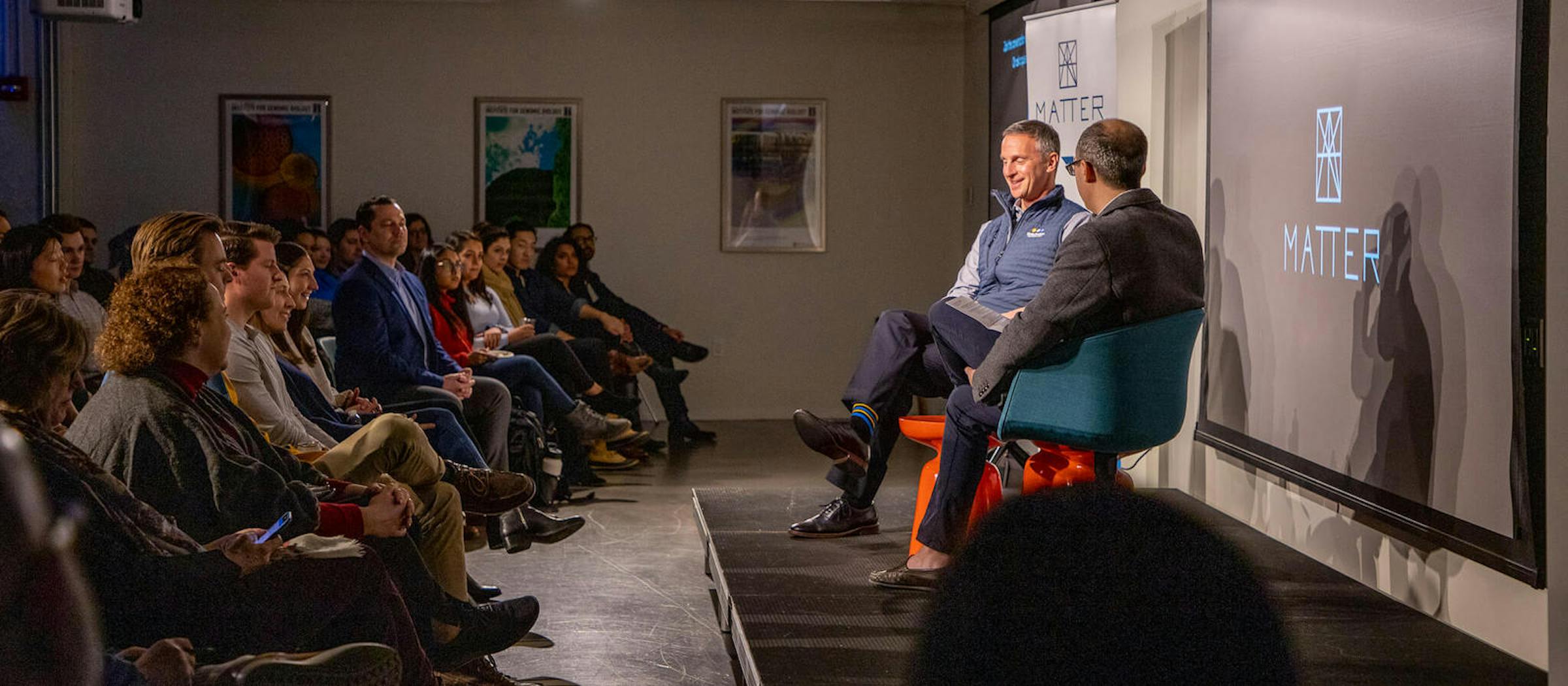“Not bits and bytes but human lives”: Strata Decision Technology CEO Dan Michelson on healing healthcare
At our February Tales from the Trenches™, Dan Michelson joined us to share insights from his 20-year healthcare career and journey as CEO of Strata Decision Technology.
Before joining Strata Decision Technology, Dan spent 12 years at Allscripts as the Chief Marketing and Strategy Officer. Dan was an integral part of the leadership team that grew Allscripts from a $50 million company with 50 employees into a $1.2 billion company with more than 6,000 employees.
When Dan joined Strata in 2012, it was a similar situation: a 50 person company with the potential for exponential growth. Over the last eight years, Dan has helped transform Strata into one of the most critical platform companies in healthcare. Today, 25 percent of U.S. healthcare flows through Strata and it has the largest data set of cost information in the country.
During the event, Dan talked about the most pivotal moments in his career and shared his thoughts on culture, hiring and maintaining a work/life balance. Here are our key takeaways. Responses have been edited slightly for length and clarity.
The journey through the healthcare pinball machine
“When I graduated from school, like a lot of people, I took a job — not necessarily knowing where it would go. After a year, I didn’t like where it was heading…[so] I [started] interviewing industries.
“Then I got to healthcare — the biggest industry in our economy and maybe the most messed up industry in our economy, so there are always going to be jobs. [There are also] always going to be problems to solve — which is where I want to be.
“The embedded experience of wanting to do work that matters and touch people’s lives always resonated with me. We have a saying we use that’s, ‘What flows through our software is not bits and bytes but human lives,’ and I truly believe in that.
“We have a saying we use that’s, ‘What flows through our software is not bits and bytes but human lives,’ and I truly believe in that.”
“I eventually cold called Allscripts and that call later ended up turning into a job and career of helping to build up that company. Along with many other people at the time, we grew the company from about 50 people to about 6,000 and to more than 1 billion dollars [in] revenue. That was quite a ride. But having spent my entire career on the clinical side, when [the opportunity to join] Strata came along, it was on the financial side and I didn’t know a lot about it — that’s what intrigued me.
The decision behind choosing Strata
“When I looked at the business of [Strata], I didn’t really understand it. So I went around talking to a bunch of people who I knew in the industry asking them questions about it. My core question was, ‘Do you understand what things cost?’ And when I asked people that question, the answer that came back was actually about price, or charges or reimbursements — not the actual cost.
“Any market opportunity is defined by the market problem. And [I thought], ‘Boy, wait a minute, this is a $4 trillion industry and maybe the biggest socioeconomic issue of our time, and yet the people who are closest to it have no clue what things actually cost.’ That’s what actually got me into the door.”
To bend the cost curve, focus on sharing cost data
“If you’re going to drive major savings within the healthcare delivery system, the default option has been calling consultants. You pay them X, have them here for X [amount] of time, they leave their recommendations behind and then you go at it. But what’s happening in reality is that everybody needs to reduce cost, right?
“[What I tell] people is that this is a $4 trillion industry with $2.5 trillion going through hospitals and health systems. When you ask them, ‘Do you know the cost of X?’ 99 percent of the time they say no — they just don’t have any of that data available. Making that data liquid is the only way to really bend the cost curve if they’re the ones who control the cost.
“75 percent of the healthcare spend is coming through the decisions of physicians and their decisions providers. So if they don’t know what [the cost of] A versus B is, then how do they know if the flight that they’re taking from Chicago to New York is $100 or $10,000? That kind of variation is happening everywhere, on everything, every day. And I’ll say this just to be clear, because we spend a tremendous amount of time with CFOs. I tell them all the same thing: Don’t ever make a decision [solely] based on cost…But, you would never fly to New York without checking, right? And that is what’s happening today [in healthcare]. There are gatekeepers and information behind that gate that people don’t trust, so it’s never used. The biggest black hole in our biggest industry is this problem.”
Driving change in healthcare means digging deep
“I’m a healthcare geek. I can’t quite stand when [people] oversimplify healthcare with a punchline, politically or otherwise. This is a very complex and important industry so there is a real need to really dig deep and get into the trenches — that is where the problems get solved.
“I try to explain to people that running a business is like a Rubik’s cube. You turn one side, you screw up the other. But healthcare kind of looks like a 17x17 Rubik’s cube — you solve a small problem then work your way out and solve the bigger one. If you’re really going to make a difference in healthcare, you have to geek out about solving one of those problems but not be so blind to think that you’re going to solve everything with a silver bullet.
“[Healthcare] is an incredibly complex set of problems, but they are solvable problems. Our mission as a company is to help heal healthcare. It’s not to heal healthcare, we can’t do that — but we work with a lot of people who can. Strata is a healthcare company [that is] trying to work these little problems out to help solve the big problem.”
“[Healthcare] is an incredibly complex set of problems, but they are solvable problems.”
Four pillars for success at Strata: service, professionalism, rock and growth
“There are four things I think that matter the most [to being successful at Strata]. One is: does that person have a service mindset? Are they really there to serve customers and each other? A second thing is professionalism:understanding how to treat people with true respect. I always tell people that you should come to work and totally be yourself — there’s not a home self and a work self.
“The third thing is something we call ‘rock’. Rocks are the big things that really need to get done and that is how you define your career. What are the big things that you’ve produced, or are you just talking about busy work and you’re consumed with that?
“The last thing is growth. If you don’t have a growth mentality and you believe yesterday is tomorrow, you will be way behind. Find something you care about and work with people you care about — that’s what we’re trying to create as a culture.”
Building trust helps to scale value within an organization
“To some extent, it comes down to whether you’re trying to sell a product or whether you’re truly trying to build relationships [with your customers] — and then through [those relationships], help them solve problems. I hate to be redundant, but that’s what it comes down to.
“We’re a big believer in sharing what we learn. Eight years ago, this company was not even known by its customers. What we really had to do was transition from being a product to being a platform and that was the biggest strategy that we nailed in order to be in the position that [we’re in].
“If people know us and trust us, they’ll do more with us. We have an obsession around being in front of customers, spending time with customers, listening to customers and caring about customers. It’s not just a relationship, it’s friendships that we really focused on building. When you have that with your customers, your job is so much more fun.”
The art of balancing work and life is control
“Everyone says it, so I have a hard time getting comfortable with repeating it, but if you’re passionate and you’re excited about [what you do], it doesn’t feel like work. I run marathons, I do a lot of non profit work and I love my job — I don’t feel like I sacrificed anything at all relative to my family.
“I don’t do calls or meetings on the weekends at all. Our team is pretty disciplined in that. You won’t see messages or meetings set up after 6:00pm. I’m very conscious about when I send emails because I know the trickle-down effect that it has.
“You have a lot more control than you think you have. How much you care and how hard you work are completely in your control and those are probably the two most important things.”
Want to learn more from leaders like Dan? Hear from Hyperfine CMO Khan Siddiqui at our next Tales from the Trenches™ on March 18. Register on Eventbrite here.



